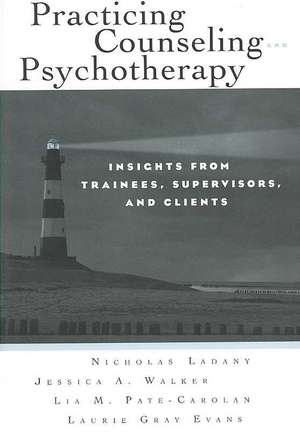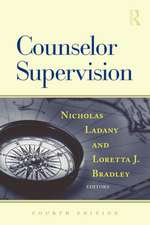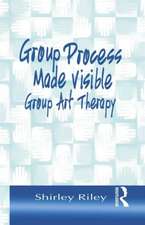Practicing Counseling and Psychotherapy: Insights from Trainees, Supervisors and Clients
Autor Nicholas Ladany, Jessica A. Walker, Lia M. Pate-Carolan, Laurie Gray Evansen Limba Engleză Paperback – 13 dec 2007
| Toate formatele și edițiile | Preț | Express |
|---|---|---|
| Paperback (1) | 369.92 lei 6-8 săpt. | |
| Taylor & Francis – 13 dec 2007 | 369.92 lei 6-8 săpt. | |
| Hardback (1) | 1099.42 lei 6-8 săpt. | |
| Taylor & Francis – 13 dec 2007 | 1099.42 lei 6-8 săpt. |
Preț: 369.92 lei
Preț vechi: 389.38 lei
-5% Nou
Puncte Express: 555
Preț estimativ în valută:
70.80€ • 72.97$ • 59.77£
70.80€ • 72.97$ • 59.77£
Carte tipărită la comandă
Livrare economică 01-15 martie
Preluare comenzi: 021 569.72.76
Specificații
ISBN-13: 9780415957397
ISBN-10: 0415957397
Pagini: 324
Dimensiuni: 152 x 229 x 18 mm
Greutate: 0.45 kg
Ediția:New.
Editura: Taylor & Francis
Colecția Routledge
Locul publicării:Oxford, United Kingdom
ISBN-10: 0415957397
Pagini: 324
Dimensiuni: 152 x 229 x 18 mm
Greutate: 0.45 kg
Ediția:New.
Editura: Taylor & Francis
Colecția Routledge
Locul publicării:Oxford, United Kingdom
Cuprins
Introduction. Introduction to Therapy Process and Outcome. Conceptualizing the Client. Understanding Yourself as a Therapist. The Therapeutic Work. Therapy Outcome. How to Best Use Supervision. Lydia’s Story. Next Steps in the Journey. Appendices. Resources & References.
Recenzii
“I highly recommend this book to beginning therapists. It provides an excellent introduction to the nuts and bolts of doing therapy. The authors have a warm and embracing tone to their writing, which makes it easy to read. The data from the big study are fascinating and provide credibility for what the authors have to say about the therapy and supervision process.”
- Clara Hill, PhD, Professor, Department of Psychology, University of Maryland
“Ladany and his co-authors offer many gems of clinical wisdom. Using their process research as a foundation, they have provided a rare illustration of the integration of science and practice for all practitioners. The inclusion of ‘the good, the bad, and the ugly’ from practicum experience is instructive not only for new clinicians, but also new (and old) supervisors.”
- L. DiAnne Borders, PhD, Burlington Industries Excellence Professor and Chair, Department of Counseling and Educational Development, University of North Carolina at Greensboro
“This book is a must for trainee mental health practitioners -- counselors, their trainers and supervisors -- and it has much of value for seasoned practitioners.... A key strength of this book is the marriage of practice and research, as the reader is pointed to relevant research and given plenty of discussion questions and exercises to consider. The authors also include an excellent appendix in which the research study that underpinned this book is presented.”
- William West, PhD, Reader in Counseling Studies and Director of Counseling Programs, University of Manchester, UK
"This book does much to help dispel myths, and also to empower and inspire new counselors. It also serves as a cautionary tale for beginnings therapists and supervisors alike about very real obstacles and roadblocks to effective counseling and supervision. At times using humor, at times simple candor, but mostly using sound clinical wisdom and practical advice derived from their own years of experience as trainees, educators, supervisors, researchers, and practitioners, the authors do an excellent job of illuminating the first steps that a trainee typically takes on his or her professional path.[I] highly recommend this book for anyone working with counseling and therapy trainees, particularly for trainees themselves, and for both new and seasoned supervisors. I also look forward to hearing more from the authors, perhaps Practicing Counseling...Psychotherapy Part II?" -Barbara Thompson, in Psychotherapy Research, September 2008; 18(5): 625-627
"The idea for the book was straightforward - the authors asked their students what type of book they wished they had had when they started their client work practice during their training, and then set out to write something that met the requirement of 'a practical, how-to book that included real life examples' (p.ix). It is a tribute to the authors that they have not only succeeded, but succeeded well in producing a book that is eminently readable, sensibly structured and liberally illustrated with anecdotes. Furthermore, the book is as descriptive as any book can possibly be in describing a perennially unique experience of what it is like for a beginning therapist in the counseling room with a real-life client in front of them. In short, I wish that I had had this book when I was training...I strongly recommend the book to all practitioners, since I think that everyone, new or experienced, will gain something from it." - Carl Stonier, Counselling and Psychotherapy Research
- Clara Hill, PhD, Professor, Department of Psychology, University of Maryland
“Ladany and his co-authors offer many gems of clinical wisdom. Using their process research as a foundation, they have provided a rare illustration of the integration of science and practice for all practitioners. The inclusion of ‘the good, the bad, and the ugly’ from practicum experience is instructive not only for new clinicians, but also new (and old) supervisors.”
- L. DiAnne Borders, PhD, Burlington Industries Excellence Professor and Chair, Department of Counseling and Educational Development, University of North Carolina at Greensboro
“This book is a must for trainee mental health practitioners -- counselors, their trainers and supervisors -- and it has much of value for seasoned practitioners.... A key strength of this book is the marriage of practice and research, as the reader is pointed to relevant research and given plenty of discussion questions and exercises to consider. The authors also include an excellent appendix in which the research study that underpinned this book is presented.”
- William West, PhD, Reader in Counseling Studies and Director of Counseling Programs, University of Manchester, UK
"This book does much to help dispel myths, and also to empower and inspire new counselors. It also serves as a cautionary tale for beginnings therapists and supervisors alike about very real obstacles and roadblocks to effective counseling and supervision. At times using humor, at times simple candor, but mostly using sound clinical wisdom and practical advice derived from their own years of experience as trainees, educators, supervisors, researchers, and practitioners, the authors do an excellent job of illuminating the first steps that a trainee typically takes on his or her professional path.[I] highly recommend this book for anyone working with counseling and therapy trainees, particularly for trainees themselves, and for both new and seasoned supervisors. I also look forward to hearing more from the authors, perhaps Practicing Counseling...Psychotherapy Part II?" -Barbara Thompson, in Psychotherapy Research, September 2008; 18(5): 625-627
"The idea for the book was straightforward - the authors asked their students what type of book they wished they had had when they started their client work practice during their training, and then set out to write something that met the requirement of 'a practical, how-to book that included real life examples' (p.ix). It is a tribute to the authors that they have not only succeeded, but succeeded well in producing a book that is eminently readable, sensibly structured and liberally illustrated with anecdotes. Furthermore, the book is as descriptive as any book can possibly be in describing a perennially unique experience of what it is like for a beginning therapist in the counseling room with a real-life client in front of them. In short, I wish that I had had this book when I was training...I strongly recommend the book to all practitioners, since I think that everyone, new or experienced, will gain something from it." - Carl Stonier, Counselling and Psychotherapy Research
Notă biografică
Nicholas Ladany, Ph.D., is Professor of Counseling Psychology at Lehigh University in Bethlehem, Pennsylvania. He has served as Counseling Psychology Program Coordinator & Director of Doctoral Training, and Chair of the Department of Education and Human Services, Prior to his affiliation with Lehigh University, he was an Assistant Professor at Temple University and a Visiting Faculty member at the University of Maryland. He received his Ph.D. at the University at Albany, State University of New York in 1992. He has published numerous articles and presented nationally and internationally in the area of psychotherapy supervision and training. His primary research interest and activity include the interrelationships between supervision process and outcome and psychotherapy process and outcome, including such issues as the working alliance, self-disclosures and nondisclosures, multicultural training, and ethics. He has served on the editorial board of the Journal of Counseling Psychology and currently is the Associate Editor of Psychotherapy: Theory, Research, Practice, and Training. He is the author of two books: Critical Events in Psychotherapy Supervision: An Interpersonal Approach and Counselor Supervision: Principles, Process, and Practice. He is a Licensed Psychologist in Pennsylvania.
Jessica A. Walker, Ph.D., is a staff psychologist at the University of North Carolina Charlotte’s Counseling Center, where she provides leadership in the areas of outreach programming and graduate training. Prior to her affiliation with UNC-C, she served as a psychologist and instructor at UNC-Wilmington. She received her Ph.D. in Counseling Psychology at Lehigh University after completing her pre-doctoral internship at Appalachian State University's Counseling Center. Jessica has published and presented nationally and internationally in her areas of research including psychotherapy supervision, countertransference and multicultural variables in counseling.
Lia Pate-Carolan, Ph.D., is a Psychologist with the ACT Medical Group, PA in North Carolina. She conducts psychotherapy with those currently residing in nursing homes and assisted living settings north of Raleigh. She completed a post-doctoral position at the New Jersey Department of Veterans Affairs focusing on Cognitive Behavioral Therapy as an intervention to reduce medical over-utilization. Her research interests include the process within therapy, and the parallel process between therapy and supervision. She is a Licensed Psychologist in New York and North Carolina.
Laurie Gray Evans, Ph.D., is a Staff Psychologist and the Director of Clinical Training at Lehigh University Counseling and Psychological Services, in Bethlehem, Pennsylvania. She received her Ph.D. at Lehigh University and has published articles and presented nationally and internationally primarily in the area of psychotherapy supervision and training. Her primary research interests and activities include the interrelationships between supervision and psychotherapy processes and outcomes, with particular interest in critical incidents, parallel processes, and transferential and character dynamics.
Jessica A. Walker, Ph.D., is a staff psychologist at the University of North Carolina Charlotte’s Counseling Center, where she provides leadership in the areas of outreach programming and graduate training. Prior to her affiliation with UNC-C, she served as a psychologist and instructor at UNC-Wilmington. She received her Ph.D. in Counseling Psychology at Lehigh University after completing her pre-doctoral internship at Appalachian State University's Counseling Center. Jessica has published and presented nationally and internationally in her areas of research including psychotherapy supervision, countertransference and multicultural variables in counseling.
Lia Pate-Carolan, Ph.D., is a Psychologist with the ACT Medical Group, PA in North Carolina. She conducts psychotherapy with those currently residing in nursing homes and assisted living settings north of Raleigh. She completed a post-doctoral position at the New Jersey Department of Veterans Affairs focusing on Cognitive Behavioral Therapy as an intervention to reduce medical over-utilization. Her research interests include the process within therapy, and the parallel process between therapy and supervision. She is a Licensed Psychologist in New York and North Carolina.
Laurie Gray Evans, Ph.D., is a Staff Psychologist and the Director of Clinical Training at Lehigh University Counseling and Psychological Services, in Bethlehem, Pennsylvania. She received her Ph.D. at Lehigh University and has published articles and presented nationally and internationally primarily in the area of psychotherapy supervision and training. Her primary research interests and activities include the interrelationships between supervision and psychotherapy processes and outcomes, with particular interest in critical incidents, parallel processes, and transferential and character dynamics.





















